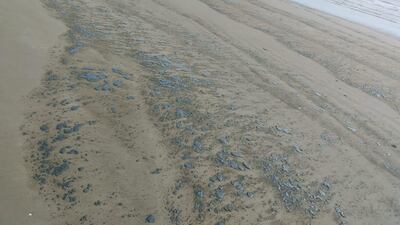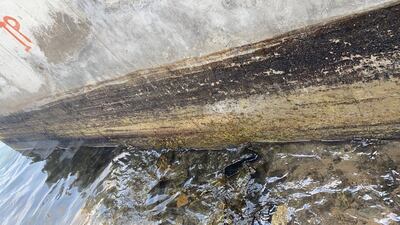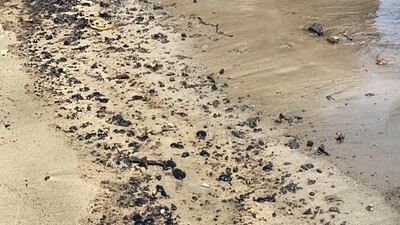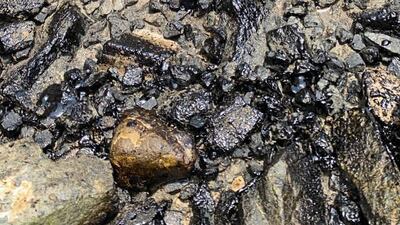Black sludge has washed up across three kilometres of pristine Kalba coastline after a suspected oil spill at sea.
The slick caused the suspension of fishing activities and the partial closure of Kalba beach.
Tuesday’s spill is the fourth along the east coast of the UAE this year and the second in the Sharjah enclave of Kalba.
The slick even threatened the protected Al Qurm Nature Reserve – a haven for sea turtles and rare birds – but barriers prevented any damage.
"Our inspectors and investigation team were immediately dispatched to the location," Shamsa Al Ketbi, director of the support services at the Sharjah Environment and Protected Areas Authority, told The National. "The team had to close parts of Kalba Corniche until the clean up process is finalised."
The cause of the spill has not been established and the clean-up is expected to take up to three days. Fishing remains suspended.
It is believed most oil spills are caused by rogue tankers cleaning their hulls in international waters. The sludge then washes ashore.
The authority is working on establishing a monitoring system to spot spills before they reach the coastline.
Fishermen said they noticed the oil sludge at Kalba fishing port early on Tuesday.
“The smell was terrible and the water colour was brown to black,” said Saeed Sultan, 35.
“I called my father and told him not to go fishing as oil sludges can stick to the fishing net and ruin it completely.”
Mr Sultan said he visited Kalba beach on Wednesday and found a dead turtle washed up on the shore.
Last month, an oil spill forced the authorities to close Kalba beach and in June oil washed ashore in Khor Fakkan in Sharjah, while a slick was reported at Al Aqah in Fujairah in March.
“The authorities should put an end to this issue and find a way to track the oil spill before it reaches the shores and affects our lives and marine life,” Mr Sultan said.
“The oil can ruin our boats, engines and fishing gear and we are still trying to recover from the summer losses due to the pandemic.
“We already lost a lot to keep our business going and we do not want to reach a point where we cannot afford to refuel our boats,” he said.
Mr Sultan also cautioned that fish could be contaminated by oil. “It is unsafe,” he said.
The Kalba Fishermen’s Association said about 60 of its members were affected by the oil spill.
“About 200 fishing boats were docked at Khor Kalba port when the oil spill reached the shores,” said Mohammed bin Shaml, the association’s deputy manager.
“And the fishing gear of about 60 fishermen was affected and some was damaged.
“This issue keeps happening regularly and the authorities should ... fine those causing it.”
UAE officials and port chiefs have called for increased surveillance of tankers so anyone in breach of rules can face sanction.
Under the Emirates’ Federal Law No 24, all means of marine transport are prohibited from discharging oil or disposing of it in the sea. Penalties include jail and fines of up to Dh1 million, but most of these incidents happen in international waters, where it becomes more difficult to police.
In 2007, the UAE signed up to the International Maritime Organisation’s Convention for the Prevention of Pollution from Ships. Also known as the Marpol Convention, it aims to stop pollution both from accidents and routine ship operations.









